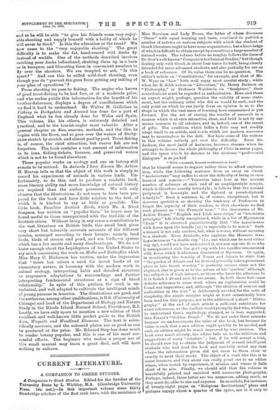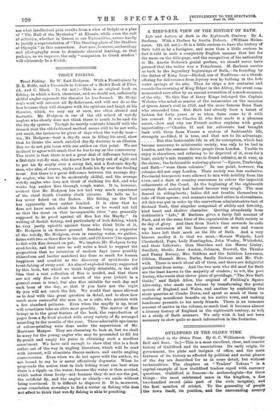C UR,RENT LITERATURE.
A COMPANION TO GREEK STUDIES.
Miss Harrison and Lady Evans, the tatter of whom discusses "Dress" with equal learning and taste, combined to publish a number of articles on various subjects with which the student of Greek literature ought to have some acquaintance, but a knowledge of which is difficult to obtain except by consulting a large number of learned works. The volume before us roughly follows the lines of Dr. G ow's well-known" Companion to Classical Studies," but though dealing only with Greek, is about four times its bulk, being clearly intended for more advanced students, and also partially for use as a book of reference. Of its value there can be no question. The editor's article on " Constitutions," for example, and that of Mr. W. Wyse on "Law" both well repay most careful study; while when Sir R. Jebb writes on " Literature," Dr. Henry Jackson on " Philosophy," or Professor Waldstein on " Sculpture," their contributions must be regarded as authoritative. Here and there an expert might, perhaps, question the validity of some state- ment, but the ordinary critic who did so would be rash, and the only point on which he can justly form an opinion is as to the shape in which the vast mass of learning here summarised is put forward. For the art of stating the results of research in a manner which is at once attractive, clear, and brief is not by any means common to all scholars, and is, indeed, one of the rarest of gifts. The erudition which befits a folio may not readily adapt itself to an article, and words which are tp0)Varill 0VVET070110 may be meaningless to the dull. Nor have some of the writera in this volume entirely got over the difficulty. Even Dr. Jackson, the most ,lucid of lecturers, becomes obscure when he attempts to discuss the whole philosophy of Plato in seven pages, and the space which he devotes to the abstruse "professorial dialogues" is so packed
" With comment, densest condensation hard,"
that he himself seems to require rather than to afford explana- tion, while the following sentence from an essay on Greek " Architecture " may suffice to show the difficulty of being at once learned and concise :—" Vitruvius takes four as the normal number of columns at each end of an amphiprostyle temple, which is therefore usually tetrastyle ; it follows that the normal peripteral is hexastylo and the dipteral or psendodipteral octastyle." Such a sentence is, of course, exceptional, but it deserves quotation as showing the tendency of Professors to forget the capacity of their readers, so that elsewhere we find such phrases as " the Francois vase," " the discoveries of Mr. Arthur Evans," "English and Irish acre-strips," or " totemistie principles" left wholly unexplained, while in a list of Mycenaean "finds" it is observed parenthetically that "the Icaosenroaos with doves upon the handle [sic] is especially to bo noted." Such a remark is not only careless, but, what is worse, without meaning to a student. Even Aristotle, who explains the Homeric Sivas apstadroace, as "a double cup " (i.e., one which can be used either way up), would not have understood it, nor can any one do so who is unacquainted with the gold cup with two handles ornamented with doves which Schliemann discovered at Mycenae. Or again, in mentioning the worship of Venus and Adonis to state that " the garden of Adonis and his festival generally take a prominent place in late Greek worship " is perfectly useless since not the slightest clue is given as to the nature of his "garden," although the subject is of high interest, as those who know the allusions to it in Isaiah i. 29 and xvii. 10 are aware. In both these last cases definite reference to some work where an explanation could be found was imperative, and, although "the citation of sources and authorities in the text" is deliberately avoided for the sake of simplicity, the ample margins might at least occasionally have been used for this purpose, nor is the addition of a short " Biblio- graphy" at the end of each article a sufficient substitute for exact references, as the student would promptly find who, wishing to understand Greek mythology, plunged, as is hero suggested, into Frazer's "Golden Bough." We do not make these remarks because we underestimate the value of the book, but because its value is such that a new edition ought quickly to be needed, and such an edition might be much improved by wise revision. The book owes much already, the editor tells us, to the criticism and suggestions of many "scholars ' ; but, if he will accept a hint, he should now try to obtain the judgment of several intelligent students who had used the book and carefully noted any case where the information given did not seem to thorn clear or exactly to meet their needs. The object of a work like this is to assist learners, and they alone can really point out to an editor where, when tested by experience, it attains and where it falls short of its aim. Finally, we should add that the volume is beautifully printed and enriched with numerous photographs, Perhaps, indeed, these latter are too numerous, adding much, as they must do, alike to size and expense. In an article, for instance, of twenty-eight pages on "Religious Institutions," plans and pictures occupy about a quarter of the space, nor is it easy to
see what intellectual gain results from a view of Delphi or a plan of "The Hall of the Mysteries" at Eleusis, while even the cult of athletics, whether in Greece or our Universities, seems hardly to justify a representation of "The Starting-place of the Stadium at Olympia " in this connection. Just now, however, archaeology and photography seem to dominate classical learning, so that perhaps, as we improve, the only "companion to Greek studies" will ultimately be a Kodak.



















































 Previous page
Previous page